In the last two days, we’ve reported in detail about the new bike-sharing system that Portland finally seems poised to secure next week.
All of these operational details have prompted a lot of discussion around a simple, fundamental question that everybody (including me, when I started reporting on bike sharing four years ago) tends to struggle with. What exactly is the point of bike sharing?
The charts below should help a lot.
This is from a 2011 survey of people who purchased memberships in the Twin Cities’ Nice Ride system. I’ve annotated it with my interpretations, but there’s a lot to see here; feel free to add your own notes in the comments.
If you’d like to learn more, this report includes analysis of this survey and a wealth of other bike-sharing studies.
It gets people who rarely rode bikes to use them more often.
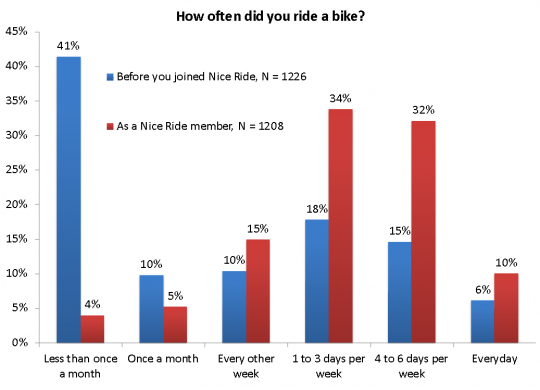
It’s mostly useful for trips other than commutes.
It replaces trips of many other modes.
It combines with trips of many other modes.
Advertisement
Its most significant effect is to make public transit better, more useful and more attractive.
What is the main annoyance of getting downtown by public transit? It’s the fact that you can’t quickly get around downtown after it drops you off.
This isn’t the only use of bike sharing, of course. But it’s the single most important problem that bike sharing helps solve, and surveys show it.
A minority of people ride public transit less after they become bike-share members. This is probably the people who live within the service area; a monthly or annual bike share membership usually costs about one-tenth to one-fifth as much as a transit pass.
If it’s a substitute for anything, it’s a subsitute for taxis.
There seems to be a typo in the category listing here; the question refers to taxis, not buses.
It improves public health.
The notion that a bike share system isn’t really for current bike users is hard for a lot of people (me included) to get their heads around. Actually, a lot of bike infrastructure works the same way. It’s not a handout to bike users; it’s a handout to people who aren’t using bikes yet.
The nice thing about that is that when more people start using bikes (or public transit, for that matter), every single one of us wins.



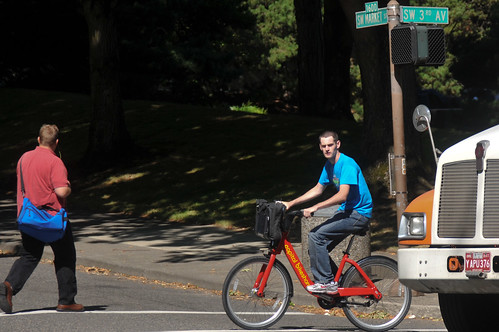
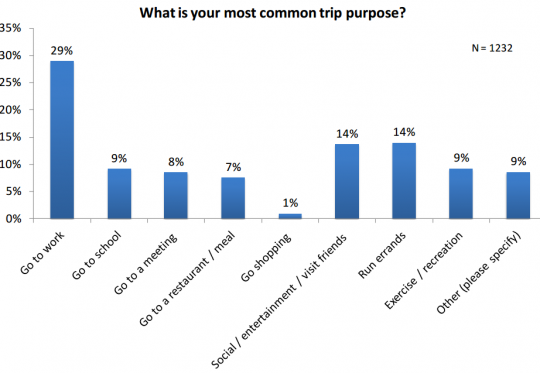
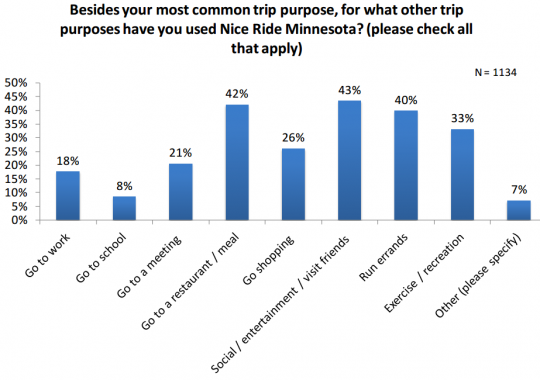
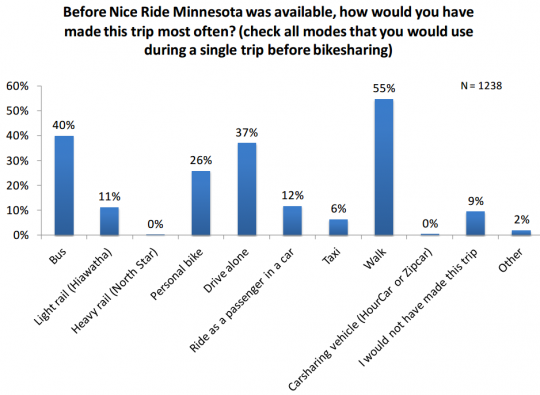
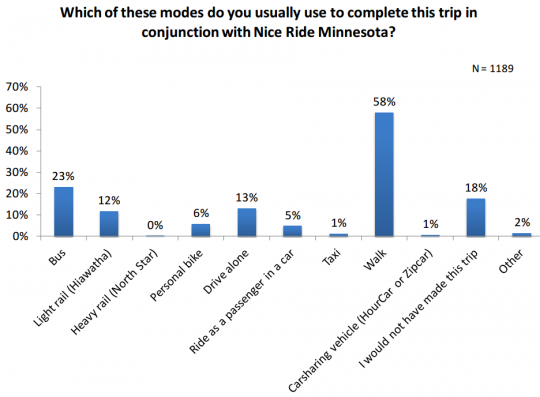
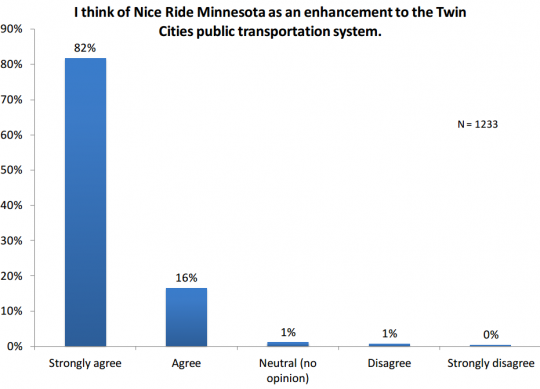
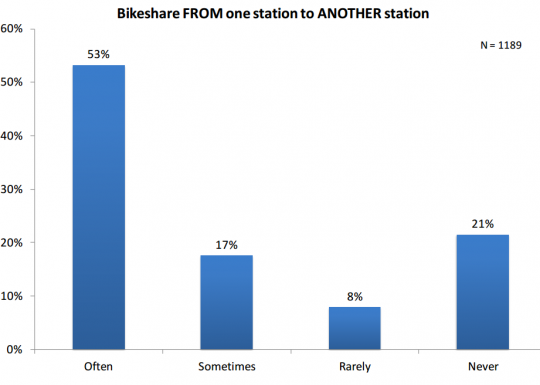
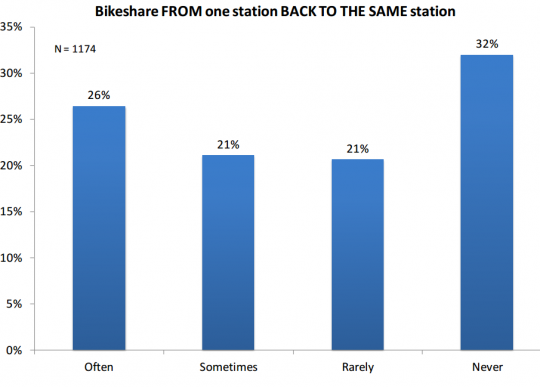
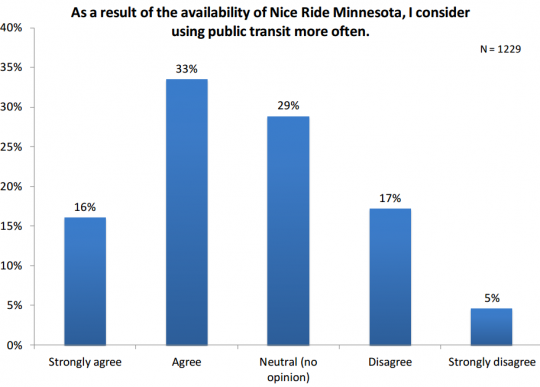
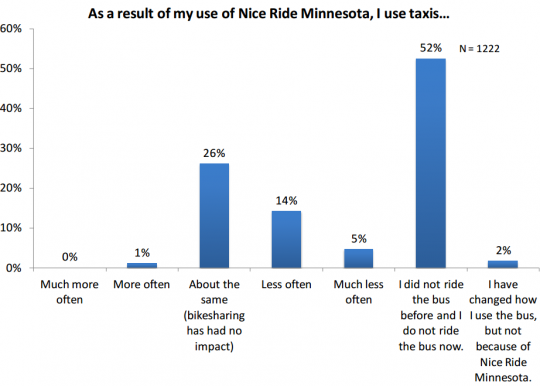
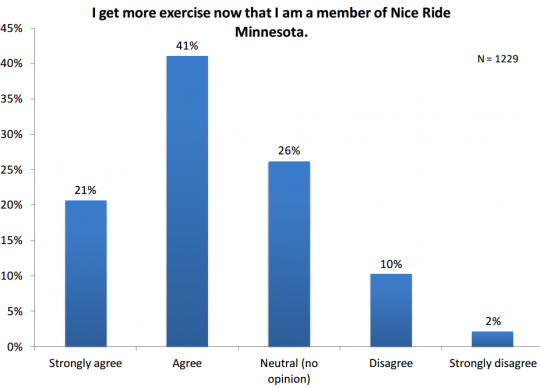
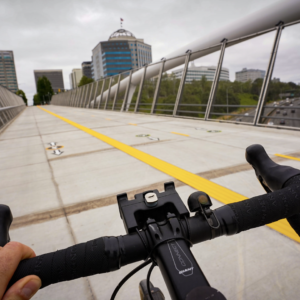
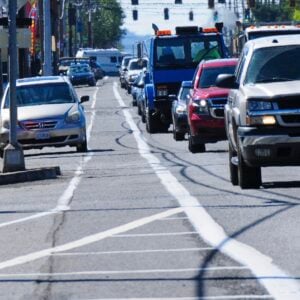

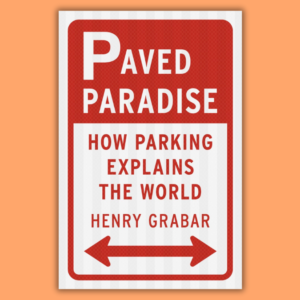
Thanks for reading.
BikePortland has served this community with independent community journalism since 2005. We rely on subscriptions from readers like you to survive. Your financial support is vital in keeping this valuable resource alive and well.
Please subscribe today to strengthen and expand our work.
Couldn’t agree more with this article. Also, the results of the survey correspond with my expectations and my planned use of a Bikeshare. I may be unique on this forum as someone who doesn’t bike in to work very often, but as a frequent transit user, I’d find a lot of use from a bikeshare. I suspect many of my expected uses would be for trips that I probably just would’ve avoided taking because it would take too long by bus or streetcar – particularly around the central city. Also, biking is just really enjoyable, especially on a surprisingly sunny afternoon in the fall, winter or spring.
I’ve used bikeshare in several other cities and found them to be really positive experiences, though the Portland system would improve upon those I think.
I’ll also note that my work provides free bicycle use, but quite honestly, I don’t use it much because I would always have to bring it back the same day and it’s much easier to just bike to one location, do what I need to do, and take transit directly home rather than backtracking (and probably lose 30 minutes of my day).
There is a proliferation of bike thefts in PDX now. How will BikeShare prevent or deter these thefts? We have brazen thieves walk right up the driveway and steal bikes from garages and backyards. Can BikePortland help end this crime? We really need help figuring this out.
“There is a proliferation of bike thefts in PDX now. ”
Perhaps. Or perhaps this is just the impression we get from reading all the media reports of it and it is more or less as bad as before. Do we have good statistics on this?
The bikes typically use specialized components, so they are worthless to strip down and re-build or re-sell. The bikes are also very identifiable, so even if a thief were to repaint it and try and ride it around or sell it, it would be obvious that the bike was a stolen shared bike.
What’s with the answers about bus use in the question about using taxis?
Pretty sure that’s just an error on the part of the graph maker. Same thing was on the similar charts for rail, walking, etc.
Yeah, must be an “oops,” and it seems like the numbers are skewed badly by the error. It’s a good question for each mode separately; too bad that happened.
The question wasn’t wrong, just the label on the chart. 52% of respondents to this survey didn’t ride taxis before Nice Ride and didn’t ride at the time of the survey, either.
Aha! Thank you! I almost didn’t say anything but now I’m glad I persisted. So, very little change in taxi use. I’d also be interested in changes in bus use.
I really don’t know what to make of these graphs.
On the one hand, they look like bike share has had a positive effect in MN. On the other hand, I don’t know what proportion of the population this represents. If there are only 20 people using the program, even if they love it, it’s basically meaningless (from a systems perspective). If a large number of people are using it, then it could be huge.
And remember, this is a survey of those who (literally) bought into the system, so they’re obviously going to be the most open and positive about the experience.
Has the membership grown over time? That seems to be a key question on whether the system is starting to penetrate the population in general.
What I really want to know is whether bike share will help make any significant mode-shift away from cars/taxis.
Subscribers: 3600
24hr Subscriptions: 37,103
Bikes Lost or Stolen: 0 ( 2 recovered from 2010 )
Accidents Reported: 0
Accidents Reported with Injury: 0
This answers your question and the question about theft above.
Also the n for each graph is in the graph, so over 1200 people make up those graphs.
https://en.wikipedia.org/wiki/Nice_Ride_Minnesota
Year Date opened Date closed Days in operation Ridership Ridership per day[18] Stations[18]
2010 June 10 November 7[1] 150 100,817[1][2] 672 65
2011 April 8[19] November 6[20] 212 217,530[21] 1,026 116
2012 April 2[22] November 4[23] 216 274,045[24][25] 1,269 145
2013 Before April 10[26] November 3[27] 207 305,000[28] 1,473 170[29]
2014 April 11 November 2 205 409,000[30] 1,995 170
So membership and riders/day has increased 4X in the last 5 years. That’s not bad.
CitiBike in New York had over 1 million trips in July, 2015. The bikes were ridden over 2 million miles that month. There are 30,000 to 45,000 trips per day, by 100,000 members, with less than 10,000 bikes: each bike is used for about 4 trips a day on average, and the busy areas have over 10 trips a day per bike. There are about 2 million people that live (and 2 million jobs) in the service area, but that is still a significant number. I suspect Portland could get 10,000 members and 2000 to 2500 trips per day for the small system planned with 600 bikes.
And Portland will have an advantage over most the other cities with the dumb stations (ie any bike rack), expansion of the Portland market will be much cheaper since it only requires more bicycles and a few lines of code to expand- not stations and bikes.
If it’s done right we might be late to dance, but I suspect we’re going to make a big fashionable entrance.
Though this proves what I’ve thought all along and bike share should be Trimets baby.
Before you get all down on the “dumb stations”, they do have advantages.
First, they create their own bike parking space that is public, i.e. “this is the spot for bike share, not there or there or there”. It remains to be seen if Portland’s bike share bikes will get locked to every fencepost and street sign around. Businesses will turn on bike share if they start having bike share bikes locked to their property or the sidewalk out front and left there.
Second, the dock system, while seeming old school, also provides a great branding opportunity for sponsors, the bike share system itself and for the city. That all may sound like wishy-washy advertising mumbo-jumbo, but it matters to corporations and the visibility of bike share. I wonder if the Portland’s lack of corporate sponsorship isn’t because a lack of stations and the branding that goes along with it. And I wonder if the lack of “real” docks and stations will make the public slowly forget about the bike share in town as the bikes get scattered to corners of Portland.
Third, the stations can let users know where bikes are. NIce Ride MN as an interactive program that real-time updates to let you know how full or empty a station is.
Fourth, docks make redistributing bikes way easier. The bikes aren’t scattered around like sheep in pasture. They are in herd and can brought back to different docks as needed.
Its not that docks are best thing ever, but they do work for a reason. Docking or dockless may depend on many factors that would unique to a city.
I think the stations serve a great purpose in awareness and advertising. Most people won’t notice a single bike locked up to a random out of the way rack. But most stations are kind of hard to miss.
Though as the article stated (one of them, anyway), a full station creates a huge amount of frustration when trying to return your bike. I can attest that fear of not being able to return my bike where I wanted deterred me from using a bike share system in the city where I lived for some time-critical trips. I think the “near the station” model is probably a good middle ground.
” I wonder if the Portland’s lack of corporate sponsorship isn’t because a lack of stations and the branding that goes along with it.”
Portland tried for many years to find a sponsor using the “dock” model but failed (due to media-driven anti-bike sentiment, IMO).
With a few exceptions, most bike share programs launch with a title sponsor. Those that don’t usually have someone come onboard pretty soon afterwards. Portland is about to launch without one. One may come on board. One may not. Seems weird a town the size of Portland couldn’t get anyone onboard.
Of course, neither of us were in the meeting with any potential corporate sponsors. Maybe the city itself had demands that no corporation would swallow. Size of the logos, etc. Or maybe the title sponsor buy-in was too large. Who knows.
And if you think you PDX is more anti-bike than some of the places bike has gone, please let us know. (Columbus, OH?… Hoboken, NJ?…)
I’m not saying docks are the be-all-end-all either. As an example, the Nice Ride bike share in greater MN doesn’t use docks, but uses locations at hotels and shops as a pseudo-dock. You want to ride around Lake Bemidji? Go to the hotel front desk and rent a Nice Ride for the morning. And Nice Ride setup the new canoe share (it’s a thing) system in MSP parks. Those don’t use docks either (well, they do, just those kinds of docks).
“…CitiBike in New York had over 1 million trips in July, 2015. The bikes were ridden over 2 million miles that month. There are 30,000 to 45,000 trips per day, by 100,000 members, with less than 10,000 bikes: each bike is used for about 4 trips a day on average, and the busy areas have over 10 trips a day per bike. …” Joseph E
Though they’re for July, one on the nicer times of year weather wise, rather than winter, those are impressive figures. I wonder what percent of the riders are of an ordinary level of physical conditioning, rather than people that are in condition to run, ride, swim, hike, etc, much longer distances than they might typically tend to ride around town on a bike share bike.
If the city does go ahead and install one, it should be interesting to watch how whatever system Portland decides to use, works out. Sounds like the systems represent a lot of extra parking clutter, though if they’re using curb parking space area where that type parking exists, it should be no worse…less worse really, than cars parked at curbs.
It’s hard for pretty much every reader of BP to get why bikeshare would appeal to anyone. We all own bikes, we all are comfortable buying and using and keeping and maintaining bikes (I know, I know, you’re different, but work with me here)…
But think about this. Most of us have had a friend or relative come to us at some time in the past few years (usually when gas hits $5 a gallon) and say “will you help me find a bike?” And what happens then? You show them your bike(s), give them a test ride or some tips, talk about what they want the bike for… maybe you take them to a shop, or recommend a shop… probably you cruise craigslist and send them some links. And if your experiences are anything like my experiences, that person who wanted a bike ends up either not getting one because they don’t really know what to get (and they don’t want to spend $800-1500 on a really decent ride, and don’t have any idea where to start with craigslist and a bunch of $200 bikes that basically look like junk to them); or they buy some crappy bike on craigslist cuz it reminds them of the one they had as a kid; and in any case, that person does not end up on a bike, or using a bike. I mean, I’ve had probably ten people come to me in this way in the past ten years, and not ONE of them has ended up regularly riding a bike for transport, even though that is what ALL of them wanted to do.
That’s because, hard as it is to believe, buying/owning/maintaining a bike is a huge barrier to people who are not… like us.
Bikeshare cancels ALL that worry and planning and money and just says, want to ride a bike from the bus stop to the dentists? Great! Here’s one.
And it works. All over the world, it works like a charm.
That’s all.
Au contraire! 🙂 I used Minneapolis’s’ bike share when I was visiting there last summer and it was wonderful. I see very much the appeal of having a share system available even if I have a regular commuter of my own.
I don’t tend to ride my bike anywhere unless I have a very secure place to lock it (e.g., I have enclosed, secure spaces at either end of my commute) or if I’m going some place like an eatery, bar or store where I’ll be able to just glance out the window to check on my ride once in a while. I’ve never gone to the movies on my bike, for example, because I don’t like the the anxiety I get with my bike locked up outside without my eyeballs nearby.
I would totally use a bike share system to do those other type of things. It would also be handy for a lot of one-way riding – like riding to a party and taking a taxi or Lyft home. It all comes down to coverage and number of stations in the share system. Minneapolis has a great system in place.
Sounds like you need a beater bike to ride on and lock up sometimes.
I have some thoughts on the Craigslist end of that equation… but your points are well taken. One thing that this suggests to me is that we could do better, should do better, on the bike literacy front.
My chief question is How did we get to the point that breaking into the biking-as-transport world is so fraught? And what else could we be doing to reduce those barriers?
I suspect that we wouldn’t find comparable barriers to entry for, say walking or driving. Why then for bikes?
In countries with high bike usage, it’s easy to buy a serviceable, low-end bike at a department or discount store. You can get a bike at Target in the USA too, but it probable won’t have fenders, lights, a kickstand, a chain guard, a rear rack or front basket. It will probably be designed to ride for recreation. Also, because the bike market in the USA has been focused on road bikes and mountain bikes for so long, there are not very many good used bikes out there. Portland has one of the most robust markets for used transportation bikes in the USA, but that’s up against weak competition.
I hope they go with a modern share bike. The B Cycle bikes in Denver are hideous and dorky. Copenhagen wheel a plus…although that’s not gonna happen.
I had no idea why anyone would use Divvy (Chicago), but then it turned out to be perfect to commute to my girlfriends place, so I joined, and then we both joined, and then soon half our trips were by Divvy, because you could take transit when it was snowing, but then bike home when it stopped. I did own three bikes, now just one, and I divvy most of the time now. Divvy survey data shows that the majority of trips are by residents who own bikes. Like me.
In this case, however, there probably won’t be any shared bikes where your girlfriend lives, because most of our residential areas are outsize the zone.
I never thought much of bike share until I visited Toronto. I would have tried to borrow a bike from somebody but instead I used Bixi. It was great! I totally understand now. I didn’t need to bring a folding bike with me in my luggage. I was able to get around a different city without so much walking as would have happened otherwise.
So, yeah, I’m convinced. If my own city had one, I don’t know if I would use it much but you never know.
Great discussion. Thanks all around.
I think it also depends on the system. I used to live in NYC and used Citibike a lot. My workplace did not have bicycle parking or showers, so I used to catch the subway to work, and bike home on Citibike, and plenty of other people did the same thing. It took me about an hour to cycle from Midtown Manhattan to Crown Heights in Brooklyn, and I needed to change bikes once, but it was a great way to get much needed exercise. In Portland, I don’t know that I’ll use bike share because I have bike parking and showers at work and my daily commute is by bike. It will be useful though to have a bike share to allow lunch time errands by bike.
I see myself using bike share a lot during the work week if I didn’t ride in that day- to run an errand during my luch break, ride over to a happy hour, etc. I own 3 bikes and am still excited to sign up! I am bummed it doesn’t go out to my house…
One use-case I can see for my own life that isn’t specifically mentioned here: visitors. I’ve got no space or reason to own more than one bike, nor do I have a car or the ability to rent one. I can easily imagine putting an out of town visitor on a bikeshare bike for at least some of our neighborhood outings.
Bike share eliminates the barriers to biking. Some people dont think about it, but for the average person, there are a ton of barriers. Where do I store a bike? How do I maintain it? What about a flat? Will it get stolen? What about lights?
Id wager that 95% of Americans own a bike…but how many of those bikes are stuffed in a garage unused for ten years? The maintenance barrier alone is killer.
Bikeshare makes all those problems go away.
I’ll ask again: Why do we have all these barriers here? Why do they (appear) not (to) operate in other countries?
Let’s take them in turn:
(1) Where do I store a bike?
Hallway, porch, garden shed. Find a spot or make one.
(2) How do I maintain it?
Start with the easy stuff. Ask at your favorite bike shop (or your friend who bikes’ favorite bike shop) what tools to start with: Allen wrenches, spoons, chain breaker, spoke wrench, 8,9,10mm open end wrenches. Adjust brakes, lube chain, and you’re most of the way there.
(3) What about a flat?
patch kit; have someone show you. That one’s a cinch, or should be.
(4) Will it get stolen?
Kryptonite. Always. Done.
(5) What about lights?
Buy some that put out a lot of light, mount them, take them with you when you park it, and stay on top of the rechargeable AA’s (my approach, there are obviously others).
OK, so how many people will get advice like this when they go to a bike shop? Unless they head to the 10% of shops in Portland that cater to transportation-oriented bike riders, they are likely to talk to a bike salesperson or mechanic who is focused on road bikes or mountain bikes. And it’s even worse for people who live out in the suburbs, where almost all the shops are sports-focused.
So why aren’t people demanding better service, recognizing, tackling, and solving these problems on their own, at whatever level they can? Change doesn’t happen without people making waves.
Bike shops aren’t hearing from the customers they don’t have. I’ve given up on any LBS in SW having so much as a larger than 28 tube, so it’s easier to just buy everything online and do it myself.
Maybe part of the barrier to successful transportation biking is the low probability of success from “ask a neighbor”? If only 3% ride somewhat regularly and you are not in that set, what’s the chance that one of your ~8 neighbors is? Meanwhile, how many people know all of their adjacent neighbors?
Storage/parking is an especially big problem in Downtown, where bike share will be most successful. Many people lack secure parking at work. And even if they have that, they might not risk riding to other places downtown for lunch or after-work errands and shopping, if they are afraid to lock up their bike outside. Bike share takes away all those worries.
Viewed this way, bikeshare is understood as an end run around neglected (social) bike infrastructure. That is interesting and probably accurate, but I’d rather see us wrestle with the problem directly, solve that, than cook up an expensive system that diverts attention from these systemic problems while introducing a new set of problems and costs.